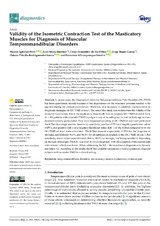Mostrar el registro sencillo del ítem
Validity of the Isometric Contraction Test of the Masticatory Muscles for Diagnosis of Muscular Temporomandibular Disorders
| dc.contributor.author | Iglesias-Peón, Marcos | |
| dc.contributor.author | Mesa-Jiménez, Juan | |
| dc.contributor.author | Fernández-de-las-Peñas, César | |
| dc.contributor.author | Rojas-García, Jorge | |
| dc.contributor.author | Rodrigues-de-Souza, Daiana Priscila | |
| dc.contributor.author | Alburquerque Sendín, Francisco | |
| dc.date.accessioned | 2022-09-05T07:38:37Z | |
| dc.date.available | 2022-09-05T07:38:37Z | |
| dc.date.issued | 2022 | |
| dc.identifier.uri | http://hdl.handle.net/10396/23823 | |
| dc.description.abstract | In recent years, the Diagnostic Criteria for Temporomandibular Pain Disorders (DC/TMD) has been questioned, mainly because of the dependence on the muscular pressure needed to be applied during the clinical examination. Therefore, it is necessary to establish improvements in diagnostic strategies for DC/TMD of axis I. The aim of this study was to determine the validity of the Isometric Contraction Test of the masticatory muscles (ICTest) to diagnose DC/TMD of axis I. Forty (n = 40) patients with muscular TMD (myalgia in any of its subtypes), as well as forty age and sex matched controls, participated. They were diagnosed according to DC/TMD of axis I and performed the ICTest in a single session. Sensitivity, specificity, positive (PPV) and negative predictive values (NPV), and positive (LR+) and negative likelihood ratios (LR−) of the ICTest compared with the DC/TMD of axis I were calculated. The ICTest showed a specificity of 95% for the diagnosis of myalgia, and between 94.9% and 96.8% for all subtypes in relation to the DC/TMD of axis I. For sensitivity, lower values were obtained, that is, 90.0% for myalgia, and losing sensitivity depending on the type of myalgia. The LR+ was over 10 for all diagnoses, with the exception of myofascial pain with referral, which was lower. When addressing the LR−, the myofascial diagnosis was the only one below 0.2. According to the results, the ICTest could be considered a valid procedure to diagnose subjects with muscular TMD in a clinical setting. | es_ES |
| dc.format.mimetype | application/pdf | es_ES |
| dc.language.iso | eng | es_ES |
| dc.publisher | MDPI | es_ES |
| dc.rights | https://creativecommons.org/licenses/by/4.0/ | es_ES |
| dc.source | Diagnostics 12(8), 1861 (2022) | es_ES |
| dc.subject | Temporomandibular disorders | es_ES |
| dc.subject | Test accuracy | es_ES |
| dc.subject | Muscle dysfunction | es_ES |
| dc.subject | Orofacial pain | es_ES |
| dc.title | Validity of the Isometric Contraction Test of the Masticatory Muscles for Diagnosis of Muscular Temporomandibular Disorders | es_ES |
| dc.type | info:eu-repo/semantics/article | es_ES |
| dc.relation.publisherversion | https://doi.org/10.3390/diagnostics12081861 | es_ES |
| dc.rights.accessRights | info:eu-repo/semantics/openAccess | es_ES |

